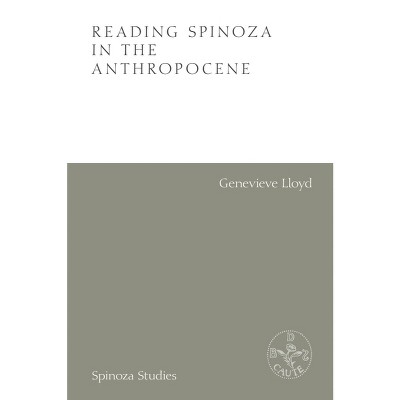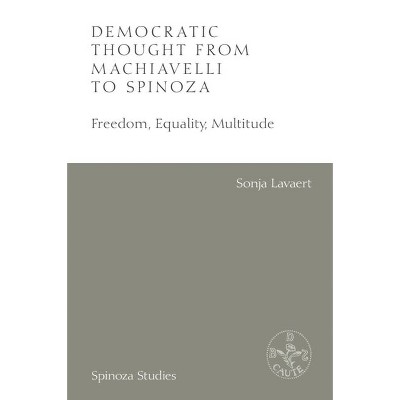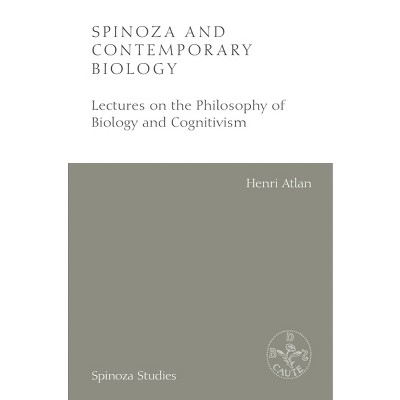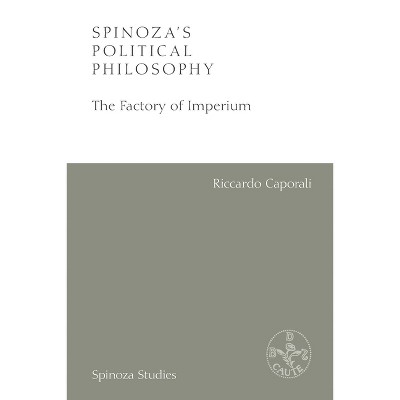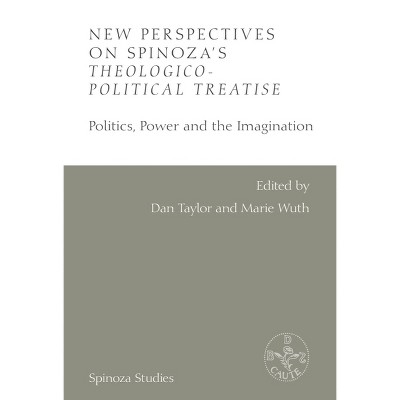Spinoza and the Politics of Freedom - (Spinoza Studies) by Dan Taylor (Hardcover)

About this item
Highlights
- Combining careful historical and textual analysis with comparisons across past and present political theory, this book re-establishes Spinoza as a collectivist philosopher.Taking as its starting point the formative role of fear in Spinoza's thought, Dan Taylor argues that Spinoza's vision of human freedom and power is realised socially and collectively.
- About the Author: Dan Taylor is a Lecturer in Social and Political Thought at the Open University.
- 304 Pages
- Philosophy, Individual Philosophers
- Series Name: Spinoza Studies
Description
About the Book
Combining careful historical and textual analysis with comparisons across past and present political theory, this book re-establishes Spinoza as a collectivist philosopher.
Book Synopsis
Combining careful historical and textual analysis with comparisons across past and present political theory, this book re-establishes Spinoza as a collectivist philosopher.
Taking as its starting point the formative role of fear in Spinoza's thought, Dan Taylor argues that Spinoza's vision of human freedom and power is realised socially and collectively. He offers a new critical study of the collectivist Spinoza, where we can become freer through desire, friendship, the imagination and transforming the social institutions that structure a given community. A freedom for one and all, attuned to the vicissitudes of human life and the capabilities of each one of us to live up to the demands and constraints of our limited autonomy.
This book develops and enriches the continental tradition of Spinozism, drawing on a range of untranslated materials and bringing a fresh perspective to key debates. It repositions Spinoza as the central thinker of desire and freedom and demonstrates how the conflicts within his work inform contemporary theoretical discussions around democracy, the multitude, populism and power.
From the Back Cover
Reconceives human freedom in Spinoza as intrinsically social and politically committed Combining careful historical and textual analysis with comparisons across past and present political theory, this book re-establishes Spinoza as a collectivist philosopher. Taking as its starting point the formative role of fear in Spinoza's thought, Dan Taylor argues that Spinoza's vision of human freedom and power is realised socially and collectively. He offers a new critical study of the collectivist Spinoza, where we can become freer through desire, friendship, the imagination and transforming the social institutions that structure a given community. A freedom for one and all, attuned to the vicissitudes of human life and the capabilities of each one of us to live up to the demands and constraints of our limited autonomy. This book develops and enriches the continental tradition of Spinozism, drawing on a range of untranslated materials and bringing a fresh perspective to key debates. It repositions Spinoza as the central thinker of desire and freedom and demonstrates how the conflicts within his work inform contemporary theoretical discussions around democracy, the multitude, populism and power. Dan Taylor is a Lecturer in Social and Political Thought at the Open UniversityReview Quotes
Dan Taylor displays extraordinary breadth of scholarship and unusual sensitivity to the colonial context in Spinoza and the Politics of Freedom. Animated by a desire for expansive fellowship, this book outlines Spinoza's elaboration of freedom as a social project of collective empowerment. At the same time, Taylor holds the 17th century author along with his 20th century admirers accountable for shrinking from the demands of emancipation and shared power. Drawing from a rich variety of sources, this book charts new paths forward for Spinoza Studies.--Hasana Sharp, McGill University
In such a crowded environment one might fear repetitiveness and lack of originality as publishers are rushing to cash in on the raging interest on Spinoza. Nothing could be further from the truth for ... Taylor's Spinoza and the Politics of Freedom [which makes] remarkably fresh, insightful and engaging contributions. ... [I]t is positioned in a cultural and political milieu where the interpretation of Spinoza is not merely an extension of the French political reading of Spinoza--primarily but not exclusive by those associated with Althusser. Rather, it is a political reading that has its own distinct English flavour, and it is geared toward a reading of Spinoza that would be useful for contemporary political struggles.--Dimitris Vardoulakis "British Journal for the History of Philosophy"
Nothing could be further from the truth for ... Taylor's Spinoza and the Politics of Freedom [which makes] remarkably fresh, insightful and engaging contributions. (...) The key to Taylor's presentation of the Spinozan vision of the political is the argument that the notion of freedom in Spinoza involves the collective. There is no individual freedom, there is only ever collective freedom.--Dimitris Vardoulakis "British Journal for the History of Philosophy"
Taylor is indeed endowed with a real talent for narrating philosophy: he knows how to construct a narrative that reads with the ease of a novel without ever compromising the philosophical analysis. This is a rare ability that allows the reader to share with the author the obvious pleasure he took in writing his book, for this very reason destined to be well received by a much wider readership than that of "professional" Spinozists.--Mogens Laerke "Archives de Philosophie"
Taylor makes a convincing argument for Spinoza's ongoing utility as a political philosopher [...] Spinoza and the Politics of Freedom makes a compelling case for Spinoza's continuing relevance.--Timothy Deane-Freeman, Deakin University "Marx & Philosophy Review of Books"
The great merit of Dan Taylor is to have returned to Spinoza's conceptions of human servitude and the efficacy of the multitude as political actor, setting aside any notion that the work of the previous generation of scholars has somehow settled the conflicts that animate these conceptions in their textual existence. His book represents an extremely erudite and provocative reconsideration of some of the most important of Spinoza's philosophical discoveries. He has opened up new paths in Spinoza scholarship.--Warren Montag, Brown Family Professor of Literature at Occidental College, Los Angeles
This book by Dan Taylor, Lecturer at the Open University in England, is a testament to the growing dynamism of Spinoza studies in Britain in recent years, especially but not only in the political thought of the philosopher. ... His emphasis on collectivity and on the collective character of freedom in particular gives the book its specificity. ... The proposed analyses are precise, sometimes inventive, but always well grounded in the texts. ... Taylor is indeed endowed with a real talent for narrating philosophy: he knows how to construct a narrative that reads with the ease of a novel without ever compromising the philosophical analysis. This is a rare ability that allows the reader to share with the author the obvious pleasure he took in writing his book, for this very reason destined to be well received by a much wider readership than that of "professional" Spinozists.--Mogens Laerke "Archives de Philosophie"
About the Author
Dan Taylor is a Lecturer in Social and Political Thought at the Open University. He is the author of Island Story: Journeying Through Unfamiliar Britain (Repeater Books, 2016), shortlisted for the Orwell Prize 2017 and Negative Capitalism: Cynicism in the Neoliberal Era (Zero Books, 2013).
Shipping details
Return details
Trending Poetry






